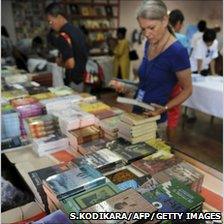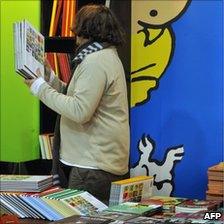Is this the end of the book?
- Published

Paperback sales are being overtaken by e-books in the US
Amazon has released figures showing that for the first time e-books outsold paperbacks in the United States. So do traditional books, printed on paper and sold in shops, have a future?
"Our vision," says the UK managing director of Amazon, Christopher North, "is that every book in every language should be available for you to download and start reading in 60 seconds."
Observers of the publishing industry say he and his fellow executives are likely to get their way.
Amazon is in an ideal position to both pioneer and exploit this movement because it also makes and sells an "e-reader" - the "Kindle" - albeit in competition with a number of other manufacturers like Sony.
But the paperback book, pioneered in the UK by Penguin in the 1930s, may have life in it yet. The same statistics show their sales are up too, but what industry analysts call the "moment of cross-over" has now arrived. Digital is becoming the dominant route to the reader.
"Our physical books sales are growing at the same time as our electronic book sales, " explains Mr North.
"But it may be that some people want an e-book for one purpose and a physical book for another."
Strength
To say that times are interesting for the UK's publishing industry at the moment is a massive understatement.
"They've had a tough year," says Neill Denny who edits the industry journal 'The Bookseller'.
"But overall publishing has been in rude health for the last decade."

Publishing is at a crossroads
That's because the industry has been able to profit from an explosion in the market for English language textbooks in fast-growing economies like India's.
But while the actual business of printing and distributing books has been healthy it's been retailers who've felt the squeeze, operating on slim margins and often closing their doors.
And as digital begins to outweigh "physical" sales, the industry will face the likelihood of even greater change.
One problem is that the arrival of digital publishing has already altered the way in which we the consumers consider buying a book.
"Where do you go to see new books?" asks Mr Denny, pointing out that booksellers on the net have often benefited from people seeing volumes on the shelf at stores and making a mental note to go online later.
"Breaking new authors is much harder digitally. Sure, you can build excitement with Facebook fan pages and the rest. But impulse buying of books can't really happen in the same way."
New readers start here
But one author and leading academic reckons the explosion of e-publishing is a great thing for reading and literature generally.
"It amounts to the creation of a library without walls," says Professor John Sutherland of University College, London.
Through my iPad (Apple's tablet computer) I can access a quarter of a million books - for nothing."
"Time was the book could be in a library, be read a few times and be a dog eared offering. But now the book is a more complex thing."
Piracy
But as publishers move to take advantage of the electronic frontier, they'll be mindful of a prominent casualty - the record industry.
A cursory search of the usual suspect sites reveals books are starting to become available via unauthorised peer-to-peer filesharing.
"Piracy is the dog that hasn't yet barked," says Mr Denny. "It hasn't really happened for e-books on any scale."
"But people who know about Digital Rights Management say any content encryption system can be cracked.
"If piracy becomes a force, then that would be a source of major alarm for the industry."
Future
But meanwhile the business of selling e-books is in its infancy and the industry is working on how best to exploit the almost limitless possibilities.
Neill Denny feels the e-book "softens people up" for a future in which the book becomes a much richer experience.
We could soon be opening an e-book and encountering not just text and pictures, he thinks, but audio and video clips, perhaps even games. You could even see films from within books.
So the e-book won't be an end to literature but could instead be a route to an even richer experience.
- Published28 January 2011
- Published28 January 2011